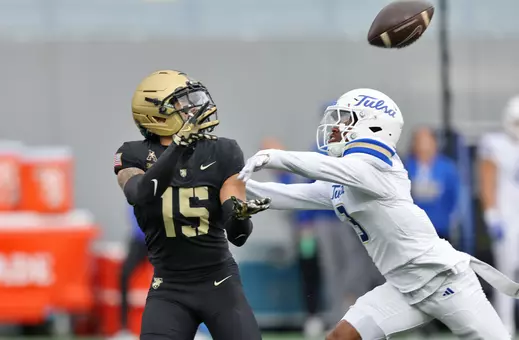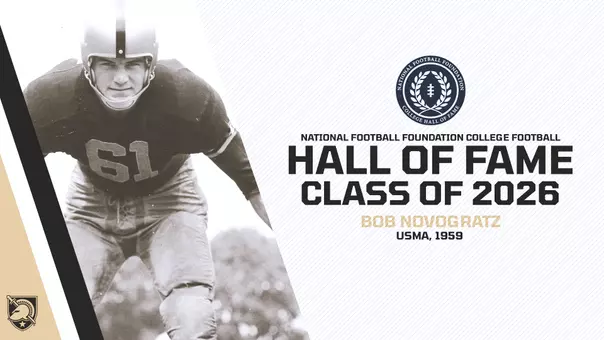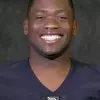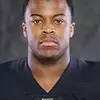Army West Point Athletics
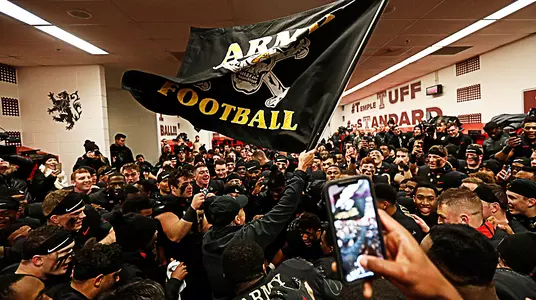
Feinstein's Findings: Outright CIC Champions
December 09, 2018 | Football
New York Times bestselling author, John Feinstein, is back for another season with the Black Knights and will report in after each football game during the 2018 season. Feinstein's weekly report will be posted to GoArmyWestPoint.com following each battle on the gridiron.
NOW, the script has truly been flipped.
In all the buildup to the 119th version of college football's best and most storied rivalry, the theme was this: Army is 9-2 and Navy is 3-9. Army has won two Army-Navy games in a row after LOSING 14 in a row.
The script has been flipped. Allegedly.
One person who didn't want to hear any of that was Jeff Monken. Having coached in this game 10 times prior to Saturday—six times as a Navy assistant coach, four times as Army's head coach—Monken knew better than to think 9-2 and 3-9 were going to mean a thing once the teams kicked off inside Lincoln Financial Field on Saturday afternoon.
"The thing I'm proudest of," he told his players when the annual long day's journey into night finally ended with Army on top 17-10, "Is that you didn't listen to all that talk about how we were 9-2 and they were…whatever. You came in here and you fought on every play and you kept your pedal to the metal for four quarters because that's what you NEEDED to do to win this game. That's what's always needed in this game."
That was a perfect description of this game. Army was the better team for most of the day and, at times, it looked as if it might blow the game open. It never happened. It rarely does when these two teams play.
The game had a different feel right from the beginning. For the first time in 17 years—hard to believe—Army was the clear favorite coming in. Navy's understandable desperation was evident even before kickoff. As the two teams headed in opposite directions down the hallway leading to their respective tunnels, there was considerable jawing back and forth—unusual, if not unique, in this game.
Briefly, it looked as if Army might blow the game open early. It took the Black Knights exactly five plays to get into Navy's end zone. The last three plays were a 17-yard Kelvin Hopkins Jr. to Glen Coates pass; a 51-yard Kell Walker sprint around the left side and a 10-yard Hopkins Jr. touchdown run. Just like that, it was 7-0 Army and there was still 12:34 left in the first quarter.
Navy picked up two first downs in that quarter—both on penalties. Jaylon McClinton wiped out the running into the kicker penalty that had given the Mids a first down at midfield by picking Zach Abey off at the Army 22 and returning it 11 yards.
Army went into grind mode, doing what it has done to teams all season—moving the ball and killing the clock as it did. A Hopkins Jr. to Walker pass keyed the drive, picking up 25-yards on a 3rd-and-12. This was the sort of football that had led to the 9-2 record coming in.
But Navy's defense dug in and stopped the Black Knights at the 16-yard-line forcing a John Abercrombie 33-yard field goal attempt early in the second quarter. Abercrombie had been perfect—literally—since taking over the field goal/PAT job in the San Jose State game. This time though, he turned human, pushing the kick just enough to miss wide right.
Navy's offense still only had the two first downs by penalty, but the score was still just 7-0.
That was the margin at halftime and one could imagine Navy coach Ken Niumatalolo telling his players, "Hey, we've been completely outplayed and it's just a one score game and it's our ball first."
Several times this season, when Army has gotten the ball to start the second half, the offense has sputtered. This time though, Navy got the ball and the defense quickly forced a three-and-out.
That set up what might have been the key drive of the game. The Black Knights ran 14 plays and took 8:19 off the clock. They moved the ball from their own 20 to a first down at the Navy 12. Along the way Hopkins Jr. had runs of 11 and 12 yards and completed a pass to sophomore Zack Boobas—the first catch of his career—for a key 14-yard gain. It was, to use a Navy term, all hands on deck.
But the Mids stiffened again and on came Abercrombie to try another 33-yard field goal. He had to wait more than four minutes to attempt the kick because a Navy player was injured and, while CBS went to commercial—someone decided this was the time for the annual on-field induction ceremony of new enlisted men and women. Even when TV was finally ready to play again, Abercrombie had to wait.
Calmly, he made the kick. It isn't a coincidence that the very first name Monken mentioned in the postgame locker room was the former sprint football player. His remarkable consistency—the one miss aside—has been a key to this season.
That made it 10-0 and when Mike Reynolds picked Abey off again, Army had a real chance to put the game away. The third quarter ended with Army facing a fourth-and-two at the Navy 43-yard-line.
There was absolutely no doubt that Monken was going to go for it. At that moment Army was 31-of-35 on fourth down for the season, having converted a fourth-and-one and having missed on a fourth-and-nine earlier in the game.
As the fourth quarter began, Hopkins ran right and looked as if he had just barely picked up the yardage. As he ran, he had tripped slightly and appeared to put his hand down but NOT his elbow. The officials signaled first down, placing the ball inside the 41-yard-line.
Then they decided to review the play to see if Hopkins had been down when his hand touched the ground.
They reviewed it. And reviewed it. And then reviewed it some more.
In all, the game came to a halt for SEVEN minutes. There is NO WAY a review should ever take anywhere close to that long. If the replay official can't see something to overturn the call within two minutes, the call should stand. By the time the officials decided to play football again, players on both teams were jumping up and down to try to stay warm and loose.
The decision was to split the baby in half. They moved the ball back two-feet—NOT to where Hopkins had put his hand down and NOT to where he had been tackled. It was, to say the least, a strange decision but it was enough to leave Army six inches short of the first down.
The delay, those six inches and the arrival of Garret Lewis in the game, changed the momentum completely.
For three quarters, Navy's offense had done absolutely nothing against Jay Bateman's defense. Abey had thrown five passes—completing two of them—to McClinton and Reynolds. Navy's rushing game was equally anemic. The fullbacks could do little and Army consistently bottled up Malcolm Perry, the Mids most explosive player, even though Navy moved him all over the field to try to create space for him.
Even more desperate now, Niumatalolo sent Lewis into the game for Abey at quarterback. A big part of Navy's troubled and brutal season began with the quarterback position. Perry began the season as the quarterback—with Abey moving to wide receiver—but it became apparent that he wasn't a triple option quarterback, but a single option quarterback: run, run and run. Teams figured that out and his production dropped rapidly.
Niumatalolo went to Lewis, the team's best passer, and he had mixed results, leading to Abey's returning to the position. He had been the best option until Saturday, when his passes looked like wounded zeppelins that never once found their target.
Navy's offense finally found life with Lewis in the game. The Mids quickly moved from their own 42 to the Army 16, their first legitimate scoring threat of the game. Lewis took off on a run that got him inside the six but got blasted by McClinton and coughed up the ball.
James Gibson jumped on it and the threat died there. All Army really needed at that moment were a couple of first downs to kill some clock and give Nick Schrage—who punted well all day—some room to flip the field.
But the Navy defense came up big again—forcing a three-and-out. Facing fourth-and-one at the 12, even Monken knew he couldn't risk being stopped.
Schrage punted and Navy took over on the Army 48. This time, it took the Mids almost no time to score: Perry finally got loose for a 43-yard jaunt and, three plays later, Lewis scored from the one and with 7:10 still left, it was 10-7.
No one who knows this rivalry had expected a blow out and, in spite of Army's three quarters of dominance, it was anything but a blowout.
Navy's sideline was alive now and the defense came out full blast, stopping the Army offense cold—three plays yielded a total of zero yards. Schrage punted again and Navy took over at its own 34 with 4:46 left, needing just a field goal to tie or a touchdown to perhaps win.
Neither came close to happening. Cole Christiansen, who was all over the field all day, nailed Lewis for a two-yard-loss on first down. Then, Perry picked up five on a short pass to make it third-and-seven.
But Navy's Peter Nestrowitz was called for a false start—bringing back memories of last year when two false start penalties during Navy's final drive in the snow, pushed field goal kicker Bennett Moehring back just far enough that his 48-yard kick on the game's final play drifted barely wide left.
Now, on third-and-12, Navy went to another trick play: Lewis pitching the ball back to slotback O.J. Davis who lofted a pass down the right sideline to Lewis. For a moment, Lewis appeared open. But, just as the ball arrived, so did Elijah Riley, knocking the ball from Lewis's arms and leaving Lewis on the turf, not moving for a moment. It was a clean hit—shoulder-to-shoulder but a brutal one.
On fourth-and-12, Abey had to come back in. There was still 3:02 left and Navy had two time outs. Niumatalolo, undoubtedly remembering 2016 when he opted to punt in a similar situation (down four) and never saw the ball again, decided to go for it.
Abey never had a chance. Bateman sent Kenneth Brinson on a blitz and he got to Abey just as he was trying to raise his arm to throw. Brinson knocked the ball loose, then fell on it on the 22-yard-line with 2:45 left.
Army needed one first down to clinch the victory. It did better than that, Hopkins Jr. diving in from the one for his second touchdown of the day—and 12th of the season—to make it 17-7 with 1:28 left.
Even then, Navy didn't quit—that word never applies in this game. With Army in a prevent defense, the Mids—with Lewis miraculously back in the game—moved the ball quickly to the Army 28. There, the defense held and Moehring came in to gain a small measure of redemption by making a 46-yard field goal to make it 17-10.
Navy's only chance with 29 seconds to go was to recover an onside kick and hope for a Hail Mary touchdown pass.
That never came close to happening. Moehring's bouncing, squirming kick went to Jordan Asberry, who bobbled it for a split second and then fell on it.
The script had been flipped. For the third year in a row, the cadets sang second—yelling 'three-peat,' several times before, 'Alma Mater,' began.
The remarkable numbers have now become almost overwhelming: 10 victories two years in a row for the first time EVER; back-to-back Commander In Chief's trophies for the first time EVER; 28 victories in three seasons for the first time EVER.
Most impressive though might have been the sight of Monken in the mosh-pit that was the Army locker room, waving a giant Army flag and screaming, "I WILL FIGHT. TILL I CAN'T FIGHT NO MORE. WHEN I CAN'T FIGHT NO MORE. I'M GONNA LAY DOWN AND BLEED AWHILE. THEN I'M GONNA GET UP AND FIGHT SOME MORE!"—his players yelling the words back at him at least a dozen times.
Monken was paraphrasing the famous phrase from the John Dryden poem that says: "I will lay me down and bleed a while and then rise up to fight again."
For years, there was a sign with those words on it that hung over the door to the Army locker room on every game day. As the players left for the field, longtime equipment manager Dick Hall would stand under the sign and make sure every player touched the sign.
The sign disappeared during the dreary early days of the 21st century. Now, Monken has brought Dryden back to the Army locker room.
After many years of bleeding, Army's football team has risen to fight again. At last, the script has truly been flipped.


